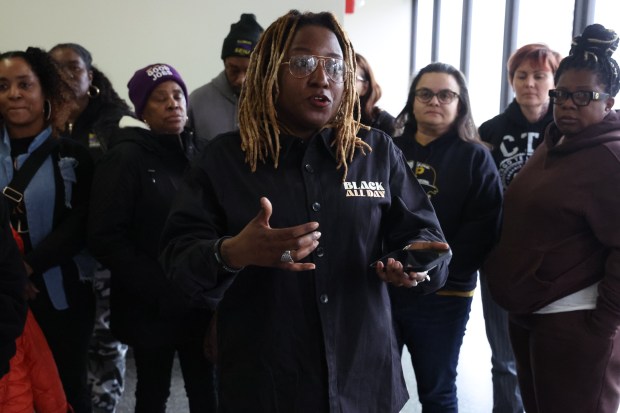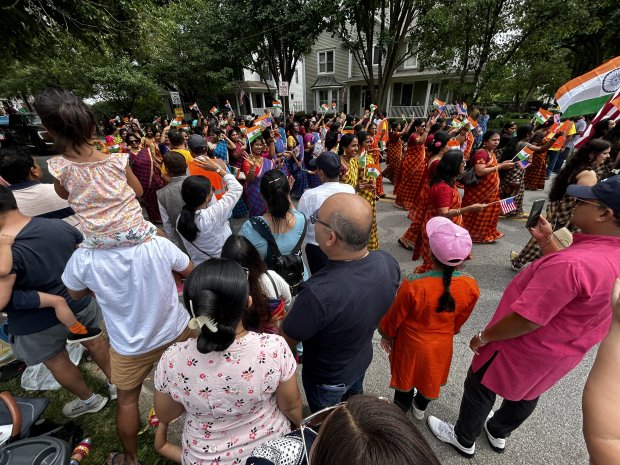Mayor Brandon Johnson’s cornerstone initiative to tackle homelessness through a referendum question to voters has essentially been booted from the March 19 ballot after Cook County Judge Kathleen Burke on Friday sided with business and real estate interests who oppose the measure.
The coalition of business groups filed suit to stop the “Bring Chicago Home” referendum question from appearing on the primary election ballot as part of the real estate lobby’s attempts to stymie Johnson’s bid to deliver on his key campaign pledge to provide homelessness services by hiking a tax on higher-priced property sales.
The suit was filed against the Chicago Board of Elections, which had already printed the referendum on ballots as both mail-in and early voting have already begun. But the ruling provides a major set back for Johnson and his progressive backers who hoped to raise roughly $100 million a year to spend on various homeless services. Both the city and the board of elections could appeal. Attorneys for both declined to comment immediately after the ruling.
Burke’s decision followed a lengthy hearing in which she painstakingly read through the case’s filings for more than two hours. She denied a motion from the Johnson administration to intervene in the case and the election board’s motion to dismiss the case.
Members of the Bring Chicago Home coalition, after hearing the ruling, stood up and chanted “68k need a place to stay!” a reference to the number of estimated people experiencing homelessness or sleeping doubled up across the city.
Coalition members said they would push ahead with their campaign and still encourage Chicagoans to vote yes in the hopes that a successful appeal would mean those ballots would be counted.
The Johnson-backed referendum that hikes a tax tied to the sale of all higher-priced properties, not just mansions, was opposed by the coalition of real estate interests who sued in January. That coalition included the Building Owners and Managers Association of Chicago, the Chicagoland Apartment Association, the Neighborhood Building Owners Alliance and others. The coalition of opponents claim if the referendum passes it will dampen sales in an already-fragile market and that the city did not have concrete plans for how to spend the additional $100 million in annual revenues the tax is estimated to raise.
Backers of the question — who had fought for years to secure additional funding — argued the lawsuit was an undemocratic attempt to confuse voters.
The referendum sought to ask voters to change how one-time taxes are charged at the time of a property’s sales. The city currently charges a flat 0.75% rate on all property sales. Bring Chicago Home calls for slightly reducing the tax charged on the first $1 million in value — to 0.6% — while increasing the rate on properties valued between $1 million and $1.5 million to 2%, and boosting the rate even more on properties valued above $1.5 million, to 3%.
While the vast majority of sales would be charged the lower 0.6% rate, larger commercial properties such as offices, large apartment buildings, stores and industrial sites would shoulder more of the burden.
The lawsuit took issue with the three-part nature of the referendum question as well as the portion that would decrease the tax rate for lower-value homes. The lawsuit also stated that there was a lack of clarity about what specific programs the estimated $100 million in additional annual revenue would pay for, which tax opponents argued is a “blank check” for the city.
The campaigns both for and against the referendum have continued uninterrupted while the court case was ongoing, with millions of dollars being raised collectively by both sides and money flowing in from outside groups.
Since the start of February alone, a political committee funded by state and national realtors groups has built up a $1.3 million war chest. The CEO of the Illinois Realtors, Jeff Baker, told the Chicago Tribune Editorial Board that money is going to targeted mailers as well as campaign advertisements online and on streaming services.
The group’s website, “Protect Chicago Homes,” says the decrease for lower-value sales is a distraction from the hike borne by other property owners. “With no plan for how to spend this New Property Tax, they’ll be coming after your house next” to adequately fund affordable housing developments.
Other opposition groups appear to be gearing up as well. Two ballot initiative committees were formed this week, according to state records. One is Keep Chicago Affordable, which appears to be an extension of the 501(c)(4) nonprofit group Chicago Forward. Both are led by Resolute Public Affairs. It has not yet raised or spent any money.
Nor has the other ballot initiative committee formed by leaders from the conservative Illinois Policy Institute dubbed “Vote No on Chicago Real Estate Tax.” The group similarly opposed Gov. J.B. Pritzker’s failed effort to change the structure of the state’s income tax.




